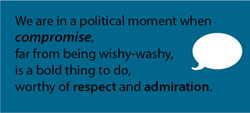
The Super Committee. The debt ceiling. Multiple fiscal cliffs. The sequester. We've added a lot of new vocabulary to the cultural lexicon for what boils down to this: Our nation's leaders routinely and repeatedly fail to work together and compromise to solve problems.
Not only do we have to watch our economy and international reputation suffer the consequences of the continuing stalemate, we also have to listen to a bipartisan litany of excuses from our nation's leaders.
Does this sound familiar?
"I am only doing what the people who voted me into office expect of me. It's not Congress that's divided, it's the American people."
Sure, there are some primary and caucus stalwarts who don't want the people they support to give an inch, but that's not the view of most Americans. Research shows that most citizens want the two sides to come together to make a deal. According to Gallup, nearly 7 in 10 Americans want Republicans and Democrats to compromise equally.
And lawmakers' intransigent ways aren't winning them any popularity contests. The American people's confidence in Congress in particular and regard for beltway politics in general is at a record low.

Moreover, the resounding imagery of a deeply-polarized, red and blue, not-very-United States is highly questionable. A few political theorists like Alan Abramowitz suggest that the general public is becoming more ideological and polarized, but other research contradicts this idea. Morris Fiorina, an expert in elections and public opinion, calls the polarized public a myth.
I lean toward the view that most people tend to be pragmatic and conciliatory, rather than ideological and rigid. I base this view on my experience having facilitated hundreds of focus groups and community forums across America and worked on scores of rigorous opinion studies on a host of issues.
Yes, surveys now pick up more polarization than in the past, but my experience is that most of it is extremely thin. The "my way or the highway" attitude tends to fall away quickly once citizens get past their initial reactions and start to engage on an issue in any depth. Given a chance to talk to their neighbors, most people approach issues with a common sense, give-a-little, get-a-little attitude. That's the case whether the topic is educating kids more effectively or facing up to the national debt.
Or how about this excuse, taking the opposite tack?
"People voted for me to lead, not to follow. My duty is to take a principled stand and not worry about the latest public opinion poll."
From this perspective, compromise is a dirty word, and absolute principle is pure and righteous. Compromise, however, is one of the grand traditions of our democracy, and a foundation upon which this nation was built.
It would be foolish to argue that leaders should respond in lock-step with every public opinion poll that comes out, but that's hardly an excuse for ignoring the public's call for progress and for politicians to act more like statesmen than zealots.
Public opinion is a critical backbone of our democracy. When designed and executed well, public opinion research can arm political leaders with important information about the sorts of reform their constituents would be willing to accept, the compromises they'd agree to, and any changes that they'd push back on. When politicians are aware of the public attitudes that may facilitate or prevent policy reform, the resulting reform is often stronger and more sustainable. Policymakers will be less likely to have to head back to the drawing board.
At the same time, it is true that innovative change often comes from outside-of-the-box thinking, and polls often query those ideas that we've heard many times before. There's certainly an art to balancing strong and visionary leadership with responsiveness to those whom leaders serve and represent. This art is too often lacking among the corridors of power today.
And what about this one?
"I'd like to be reasonable, but the other side (pick your favorite other side) would just take advantage. If they'd be reasonable, then I could be, too."
It's tempting to dismiss this line of attack as basically the time-honored kindergarten tactic: "he hit me first!" But this is a real and challenging dynamic that game theorists and others have long studied. Fortunately, leaders can break through this mindset and behavior pattern -- if they have the will to take the risk and the skill to do so dexterously.
It's fair to acknowledge that those forging a compromise take on short-term risks that their opponents will take advantage. But political leaders can withstand and navigate that risk as they recognize the broad public demand for Washington to get past gridlock and make progress, even imperfect progress.
There is hope in today's public mood. We are in a political moment when compromise, far from being wishy-washy, is a bold thing to do, worthy of respect and admiration. Those who compromise on the behalf of attainable progress are likely to reap the benefits of a public grateful for forward movement, rather than the dead-in-the-water doldrums we have become accustomed to but not satisfied with.
Smart leaders will harness this political moment, set aside their bipartisan litany of excuses and begin to address the tough problems we face. Only by doing so can we build a future fit for our children, rather than leaving them with sorry excuses, dwindling hopes, and the dregs of our dysfunction.